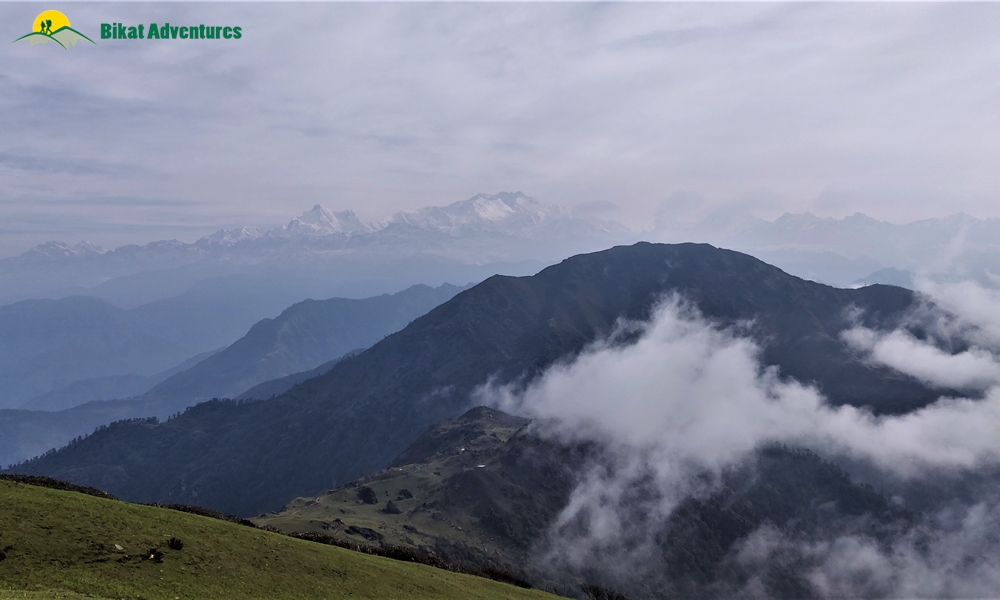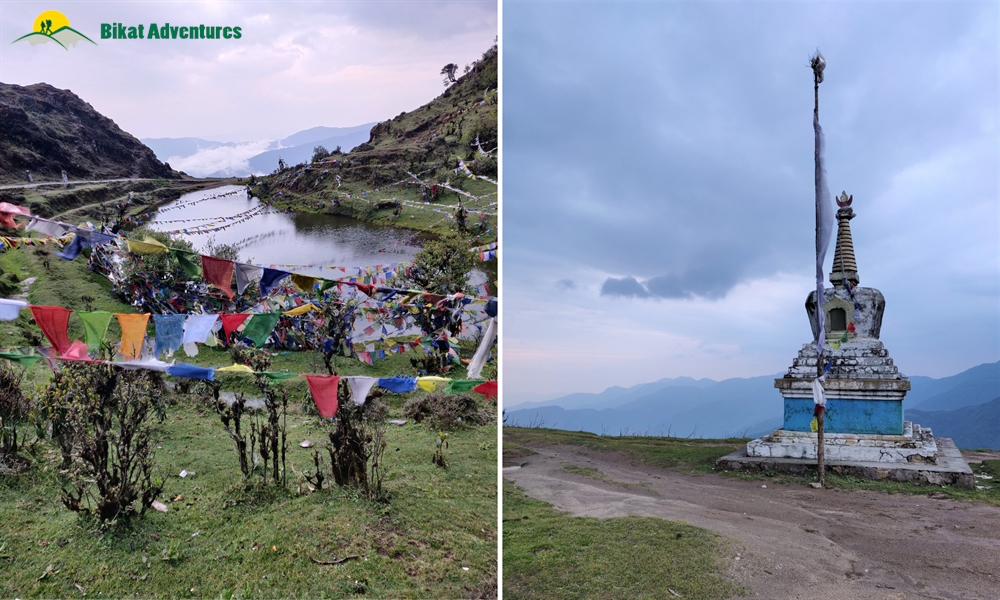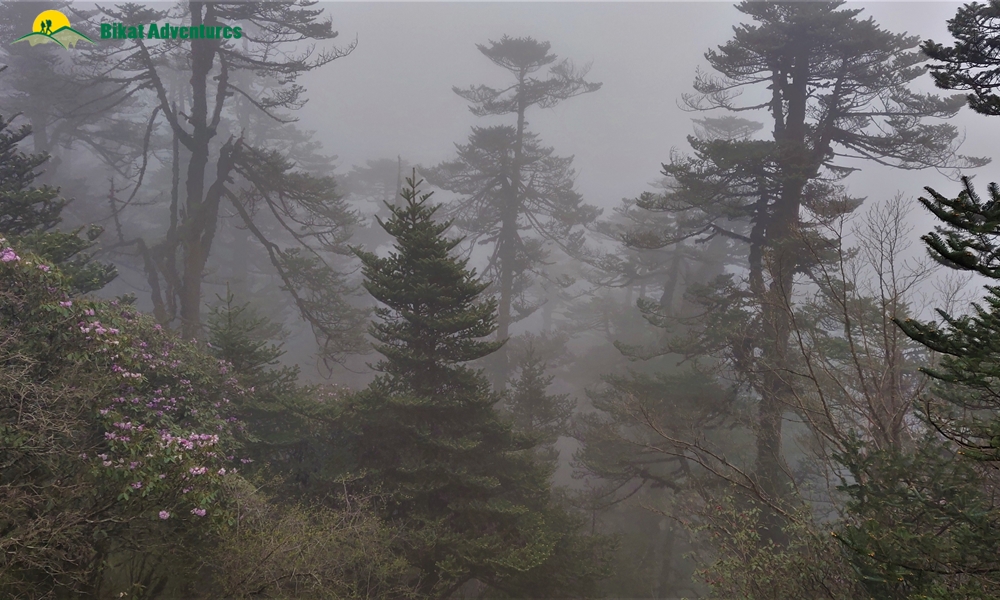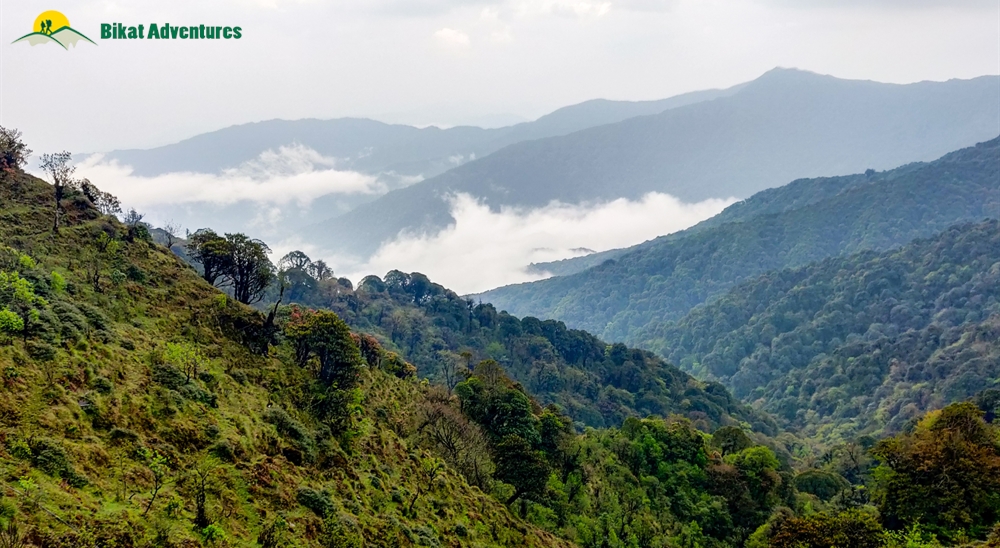The Sandakphu trek in West Bengal offers a breathtaking experience of witnessing four of the world's tallest peaks, including Mount Everest and Kanchenjunga. It is a unique adventure that blends stunning Himalayan vistas with the rich culture and diverse flora of Singalila National Park. This trekking in India provides an opportunity to explore vibrant rhododendron forests, towering bamboo groves, and catch unforgettable sunrises and sunsets over the majestic mountains.
For new trekkers, the Sandakphu trek is an ideal start to experience the thrill of high-altitude trekking in Bengal. With reliable tea houses along the route, good road connectivity, and a relatively lower risk compared to other Himalayan treks, it offers a beginner-friendly introduction to the region's natural beauty. This essential guide will cover the trek's highlights, preparation tips, seasonal variations, and costs to help you plan an unforgettable Sandakphu trekking adventure.
Discovering Sandakphu Trek
 Highlights of Sandakphu Trek
Highlights of Sandakphu Trek
Sandakphu (3636 m; 11,930 ft) is a mountain peak in the Singalila Ridge on the India-Nepal border, offering a unique trekking experience that traverses both countries. It is the highest point of the ridge and the state of West Bengal, India, situated at the edge of the Singalila National Park with a small village on the summit.
Geographical Location
The Sandakphu trek lies in the Darjeeling district of West Bengal, providing breathtaking vistas of the world's tallest peaks, including Everest, Kangchenjunga, Lhotse, and Makalu. An interesting aspect of this trek is that it crosses the India-Nepal border, with Chittrey being the first spot where you'll see pillars marking the international boundary. Trekkers can experience the unique opportunity of walking in India and having their dinner in Nepal.
Landscape and Flora
The Singalila National Park, through which the trek passes, is renowned for its rich vegetation and fauna. On day 3, trekkers will traverse through the park, where they may witness the fiery red Rhododendron trees in full bloom during March or April. These trees are home to the endangered Red Panda, with an estimated wild population of less than 10,000. If lucky and quiet, trekkers may spot these elusive creatures along this stretch of the trek.
The descent to Gorkhey takes trekkers through one of the most enchanting forests, with dense rhododendron, bamboo, and brown oak trees. North of Samanden, an expansive stretch of bamboo forms a canopy, filtering the sun's rays and creating a soft, emerald glow, transporting visitors to a world of wonder and magic. The vibrant biodiversity of the region includes Magnolias and Rhododendrons, adding to the scenic, picture-perfect landscape.
Is Sandakphu a Beginner-Friendly Trek
 Highlights of Sandakphu Trek
Highlights of Sandakphu Trek
The Sandakphu-Phalut trek is considered a moderate-level trek, suitable for both beginners and experienced trekkers. It offers a well-marked trail, with proper signage and infrastructure, making it a relatively easy and accessible trek for those new to trekking. While it does not take trekkers to extremely high altitudes, the trek does present some challenges in the form of long distances each day, various steep ascents, and unpredictable weather conditions.
Overall Trekking Experience
The Sandakphu-Phalut trek typically takes around 6-7 days to complete, covering a distance of approximately 50-60 kilometers. The trek route is well-maintained, with proper campsites, rest houses, and tea shops along the way, providing a comfortable trekking experience. Porters and guides are readily available to assist trekkers, making the trek more accessible for those who prefer not to carry their own gear.
The trek offers a gradual ascent, with the highest point being Sandakphu at an elevation of 3,636 meters (11,929 feet), making it a manageable challenge for beginners. However, beginners should be aware of the symptoms of altitude sickness and take necessary precautions.
Supportive Infrastructure
The trekkers' huts on the Indian side are not well-maintained, but the Sashashtra Seema Bal (SSB) guarding the India-Nepal border restricts foreigners from crossing over to Nepal for better accommodation facilities. To address this, the West Bengal Forest Development Corporation Limited (WBFDCL) plans to build cottages with kitchen and dining facilities at Tonglu and Chitre villages, as well as start tent and camping facilities at Sandakphu, Phalut, and Gairibas. Additionally, a waste management facility is proposed to cater to these facilities and address litter in the area.
The Power department also plans to submit a proposal for setting up a power sub-station in close coordination with the Forest department, and the stretch of the road from Bikaybhanjyang to Sandakphu will be repaired. These initiatives aim to improve the overall trekking experience and infrastructure for both beginners and experienced trekkers.
While the Sandakphu-Phalut trek is not as technically challenging as some other treks in the Himalayas, it is still important for beginners to be adequately prepared physically and mentally. Proper gear, clothing, and training are essential for a successful trekking experience in the high-altitude Himalayan region.
Preparation and Training
Pre-Trek Conditioning
As a beginner, it is crucial to start preparing for the Sandakphu trek at least a month in advance. Building endurance through regular exercise such as hiking, running, or cycling is essential. Physical fitness is vital, as Sandakphu has long trails, so practicing walking with a load for long distances is recommended.
Your preparation should begin several weeks (maybe three months) in advance. Take regular long walks in the morning and evening, preferably on a treadmill machine with a 20-30° gradient. This will help ensure you don't get muscle cramps while walking uphill.
It's also advisable to acclimatize your body to high altitudes by spending time at higher elevations before the trek. This will help your body adjust to the lower oxygen levels at higher altitudes, reducing the risk of altitude sickness.
Mental Preparation
While physical preparation is essential, mental strength plays a crucial role in trekking. As one trekker shared, "It's not everything about physical ability. Actually, it's more about your mental strength. I think it's 70% mental and 30% physical ability."
Remember, one of the fundamental guidelines of a trek is to take it easy, enjoy the hike, and embrace nature. It's not about rushing to reach the summit at Sandakphu for a great view of the snow peaks; it's about experiencing the entire journey and soaking in every moment. Take easy, slow steps, and enough breaks, so exhaustion doesn't spoil the experience.
Staying hydrated is also crucial. Drink at least a liter of water every two hours while trekking, and continue drinking enough water even after reaching your night stay. This will help flush out excess lactic acid buildup in your body.
Remember to take short, easy, and slow steps, pause, take breaks, enjoy, and walk. Rest when you get tired, and don't try to keep pace with seasoned trekkers. Since oxygen levels decrease at higher altitudes, reduce your need for it by walking slowly and avoiding exhaustion.
Sandakphu Trek During Different Seasons
 Highlights of Sandakphu Trek
Highlights of Sandakphu Trek
The Sandakphu trek offers a unique experience during different seasons, each with its own charm and challenges.
Spring and Autumn
In the spring (March to May), when rhododendrons bloom, Sandakphu is one of the top three rhododendron treks for Indiahikers. The showy blooms of pink, red, scarlet, and white flowers swathe the mountainside, creating a truly magical moment. The weather is pleasant, making it one of the best times to trek to Sandakphu.
Autumn (October to December) is another ideal time for trekking, as the skies are generally clear, offering stunning views of the Himalayan peaks, including Mount Everest, Kanchenjunga, Lhotse, and Makalu. The monsoon's departure leaves behind inviting trails and breathtakingly lush landscapes, making trekking a delightful experience.
Winter Trekking
Trekking to Sandakphu in January can be a beautiful but challenging experience. Sandakphu is the highest peak in West Bengal, India, and offers stunning views of four of the world's five highest peaks, including Mount Everest and Kanchenjunga.
However, there are some important factors to consider before deciding to trek in January:
- Weather: January is the winter season in the region, and temperatures can drop significantly, especially at higher altitudes. The weather can be harsh, with freezing temperatures and snowfall. Trekking paths may be covered with snow and ice, making the terrain slippery and more challenging.
- Difficulty: Trekking to Sandakphu in January can be physically demanding and requires a higher level of fitness due to the cold weather and snow-covered paths. It may not be suitable for beginners or those without prior trekking experience.
- Limited facilities: During winter, the region experiences lower tourist footfall, and some tea houses and accommodations along the route may be closed. It's crucial to check the availability of food, water, and shelter before planning the trek.
- Safety: Trekking in winter involves certain risks, such as hypothermia, frostbite, and avalanches. It's essential to take appropriate precautions, be well-prepared with proper gear and clothing, and trek with experienced guides.
- Restricted views: While the landscapes can be breathtaking, there might be days with low visibility due to fog or snowfall, which could limit your chances of seeing the iconic mountain peaks.
Winter trekkers should heed the advice: dress in layers! Thermals, sturdy jackets, and snow boots are essential. Ensure you have the latest Sandakphu trekking season guide insights for the best experience.
Conclusion
 Sandakphu Trek Highlights
Sandakphu Trek Highlights
The Sandakphu trek offers an unparalleled experience for trekkers of all levels, from beginners to seasoned adventurers. With its stunning vistas of the world's tallest peaks, diverse flora, and rich cultural heritage, this trek promises an unforgettable journey through the heart of the Himalayas. Whether you choose to embark on this adventure during the vibrant spring bloom or the crisp autumn months, the Sandakphu trek will leave you in awe of nature's grandeur.
Proper preparation, both physical and mental, is key to ensuring a safe and enjoyable trekking experience. By following the guidelines and advice provided, you can overcome the challenges that come with high-altitude trekking and fully immerse yourself in the beauty of the Singalila Ridge. To enhance your knowledge and plan your trek with confidence, visit Bikat Adventures' comprehensive Sandakphu trek itinerary.
FAQs
1. Is the Sandakphu trek suitable for beginners?
Absolutely, the Sandakphu trek is suitable for beginners. It is considered to have a moderate difficulty level, making it accessible for those who are fit and have minimal trekking experience. Beginners can truly enjoy the stunning landscapes that Sandakphu has to offer.
2. Is a guide required for the Sandakphu trek?
Yes, a guide is mandatory for the Sandakphu trek as it passes through Singalila National Park. Regardless of the route chosen, trekkers must have a guide with them throughout their journey.
3. What is the duration required to complete the Sandakphu trek?
The standard Sandakphu trek package suggests a duration of 5 nights and 6 days. This allows for a leisurely pace to fully enjoy the trek and its surroundings.
4. What is the difficulty level of the Sandakphu trek?
The Sandakphu trek is categorized as easy to moderate in terms of difficulty. It offers trekkers the unique opportunity to be surrounded by some of the world's highest peaks, including Mount Everest, Kangchenjunga, Lhotse, and Makalu, providing spectacular views throughout the trek.















